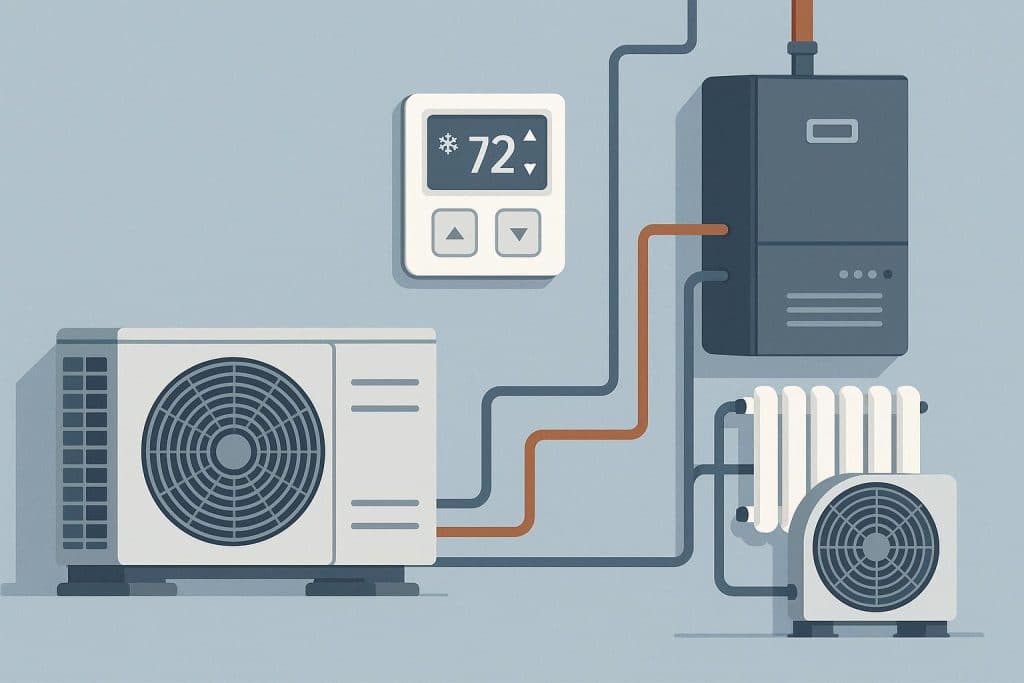When it comes to maintaining comfortable indoor environments year-round, HVAC systems are the backbone of reliable climate control. From maintaining cool air during sweltering summers to ensuring consistent warmth through freezing winters, a well-functioning heating and cooling system plays a crucial role in both comfort and energy efficiency. Yet, these systems require consistent care, timely repairs, and professional oversight to remain effective. We will explore how an HVAC contractor ensures the reliability of AC repair, heating repair, and heat pump maintenance, emphasizing their role in optimizing performance, preventing breakdowns, and extending the lifespan of essential equipment.
How HVAC Contractors Maintain Efficiency and Comfort in Every Season
1. Conducting Thorough System Diagnostics Before Any Repair
One of the most critical steps HVAC contractors at Bowles Heating and Cooling take in ensuring reliable AC and heating repair is performing detailed diagnostics. Before replacing parts or refilling refrigerants, they start by examining the entire system to identify signs of wear, leaks, or performance inconsistencies. This diagnostic phase helps them pinpoint the exact issue rather than applying temporary fixes. Contractors utilize advanced tools, such as digital gauges, airflow meters, and thermal sensors, to assess the health of the HVAC unit. By doing so, they not only address immediate malfunctions but also prevent related issues that could arise in the near future.
For instance, if a technician discovers an airflow imbalance during AC repair, they might trace it back to a clogged filter or a malfunctioning blower motor. Similarly, with heating systems, they check the ignition components, heat exchangers, and thermostats to guarantee optimal functionality. Such precision-driven inspections ensure energy efficiency, reliable comfort, and lower long-term repair costs.
2. Ensuring Correct Component Replacement and Quality Parts Usage
HVAC contractors understand that the reliability of any repair heavily depends on the quality of parts used. Whether it’s a compressor for an air conditioner or a capacitor in a heat pump, every replacement component affects long-term performance. Contractors source original and compatible parts from trusted manufacturers, ensuring they meet system specifications and energy efficiency standards. Incorrect or low-quality replacements can cause systems to malfunction prematurely, reduce performance, or void warranties.
For example, using an incorrect refrigerant type or a mismatched coil can affect an AC unit’s ability to cool effectively. Similarly, improper replacement of the heating element can lead to inconsistent temperatures or even safety risks. By adhering to strict part-matching procedures and verifying compatibility with manufacturer guidelines, HVAC contractors provide assurance that every repair or maintenance task supports the system’s integrity. This careful approach not only restores system performance but also contributes to energy savings and extended equipment life.
3. Applying Preventive Maintenance to Minimize Future Issues
Reliable HVAC performance isn’t achieved through reactive repairs alone—it depends on preventive care. Contractors implement routine maintenance schedules that include filter changes, coil cleaning, refrigerant level checks, and electrical inspections. These preventive steps are crucial in identifying small issues before they escalate into major problems. For instance, cleaning condenser coils in an air conditioner allows heat to dissipate efficiently, improving cooling performance while lowering energy consumption.
Likewise, lubricating moving parts within heating systems prevents friction that can cause damage to components. Heat pump maintenance often involves ensuring the defrost cycle operates properly to avoid ice buildup during cold months. Contractors also calibrate thermostats and verify the efficiency of ductwork, both of which significantly impact comfort and energy use. By implementing a consistent maintenance plan, HVAC professionals help homeowners and businesses maintain stable system performance, lower energy bills, and enjoy peace of mind throughout the year.
4. Prioritizing Energy Efficiency and System Optimization
An essential part of reliable HVAC service is energy efficiency. Contractors not only repair malfunctioning systems but also take measures to enhance their performance for reduced energy consumption. For example, during AC repair, they may adjust refrigerant charge levels or inspect duct leaks that cause cooling losses. For heating systems, they evaluate combustion efficiency to ensure that furnaces burn fuel effectively without wasting energy. Heat pumps, which serve dual functions for both heating and cooling, benefit from efficiency tuning to ensure smooth seasonal transitions.
Contractors might recommend adding programmable thermostats or upgrading to variable-speed motors for better temperature control. These small adjustments result in significant energy savings while improving indoor comfort. Optimizing system efficiency also contributes to environmental sustainability, reducing the household’s carbon footprint. By addressing energy waste through proper diagnostics and adjustments, HVAC contractors make sure that every unit functions at peak performance while keeping utility costs manageable year-round.
5. Adhering to Safety Standards and Compliance Protocols
Safety is a critical aspect of HVAC repair and maintenance that contractors take very seriously. Every air conditioning, heating, or heat pump service is performed in accordance with safety and building code standards. This includes handling refrigerants responsibly, ensuring electrical connections are secure, and confirming that ventilation systems meet health and safety requirements. For instance, refrigerants must be contained and disposed of in accordance with environmental regulations to prevent harmful emissions. Heating repairs often involve inspecting gas lines or combustion chambers for leaks, which could pose fire or carbon monoxide risks if left unchecked.
Contractors are trained to identify and correct these hazards while maintaining compliance with local codes and manufacturer recommendations. By combining technical precision with safety awareness, they protect both the property and its occupants. Ensuring safety also reinforces reliability since systems that meet compliance standards are less prone to breakdowns or dangerous malfunctions, providing long-term peace of mind.
Reliable HVAC repair and maintenance hinge on thorough diagnostics, high-quality parts, preventive strategies, and a strong focus on safety and efficiency. An HVAC contractor’s commitment to accuracy, care, and customer communication ensures that systems remain dependable throughout every season. Whether it’s air conditioning repair, heating maintenance, or heat pump servicing, their structured and attentive approach guarantees that every component performs as intended. By ensuring comfort and reliability, HVAC contractors uphold the standards that keep homes and businesses running smoothly throughout the year.
